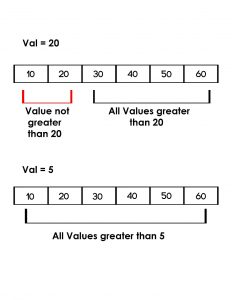Python | Check if all the values in a list that are greater than a given value
Last Updated :
27 Mar, 2023
Given a list, print all the values in a list that are greater than the given value

Examples:
Input : list = [10, 20, 30, 40, 50]
given value = 20
Output : No
Input : list = [10, 20, 30, 40, 50]
given value = 5
Output : Yes
Method 1: Traversal of list
By traversing in the list, we can compare every element and check if all the elements in the given list are greater than the given value or not.
Implementation:
Python
def check(list1, val):
for x in list1:
if val>= x:
return False
return True
list1 =[10, 20, 30, 40, 50, 60]
val = 5
if(check(list1, val)):
print"Yes"
else:
print"No"
val = 20
if(check(list1, val)):
print"Yes"
else:
print"No"
|
Time Complexity: O(n)
Auxiliary Space: O(1)
Method 2: Using all() function:
Using all() function we can check if all values are greater than any given value in a single line. It returns true if the given condition inside the all() function is true for all values, else it returns false.
Implementation:
Python
def check(list1, val):
return(all(x > val for x in list1))
list1 =[10, 20, 30, 40, 50, 60]
val = 5
if(check(list1, val)):
print"Yes"
else:
print"No"
val = 20
if (check(list1, val)):
print"Yes"
else:
print"No"
|
Time Complexity: O(n)
Auxiliary Space: O(1)
Method 3 : Using min() method
Python3
list1 =[10, 20, 30, 40, 50, 60]
val = 5
if(min(list1)>=val):
print("Yes")
else:
print("No")
|
Time Complexity: O(n)
Auxiliary Space: O(1)
Method 4: Using any function
One approach is using a generator expression with the any function.
Here is an example of how this can be implemented:
Python3
def check_greater(lst, val):
return not any(x <= val for x in lst)
list1 = [10, 20, 30, 40, 50]
val = 20
print(check_greater(list1, val))
val = 5
print(check_greater(list1, val))
|
Time complexity: O(n), where n is length of list
Auxiliary Space: O(n)
Method #5:Using filter()+lambda functions
Python3
def check(list1, val):
return(len(list(filter(lambda x: x > val, list1))) == len(list1))
list1 = [10, 20, 30, 40, 50, 60]
val = 5
if(check(list1, val)):
print("Yes")
else:
print("No")
val = 20
if (check(list1, val)):
print("Yes")
else:
print("No")
|
Time Complexity : O(N)
Auxiliary Space : O(N)
Method#6: Using Recursive method.
Algorithm:
- The check function takes two arguments: list1 and val.
- If the length of the list is 0, the function returns True, since an empty list has no elements that could be less than val.
- Otherwise, the function checks if the first element in the list is greater than val.
- If it is, the function calls itself with the rest of the list (from the second element onward) and the same value val.
- If it is not, the function returns False, since not all the elements in the list are greater than val.
Python3
def check(list1, val):
if len(list1) == 0:
return True
if list1[0] > val:
return check(list1[1:], val)
else:
return False
list1 =[10, 20, 30, 40, 50, 60]
val = 5
if(check(list1, val)):
print("Yes")
else:
print("No")
val = 20
if(check(list1, val)):
print("Yes")
else:
print("No")
|
The time complexity of the check() function is O(n), where n is the length of the input list. This is because the function recursively calls itself on a smaller input size until it reaches the base case, which will happen after n iterations if the list is of length n.
The space complexity of the check() function is O(n), where n is the maximum depth of the recursion. In the worst case, the recursion depth will be equal to the length of the input list, so the space complexity is O(n). This is because each function call creates a new stack frame on the call stack, which consumes memory, and this stack grows until the base case is reached.
Like Article
Suggest improvement
Share your thoughts in the comments
Please Login to comment...